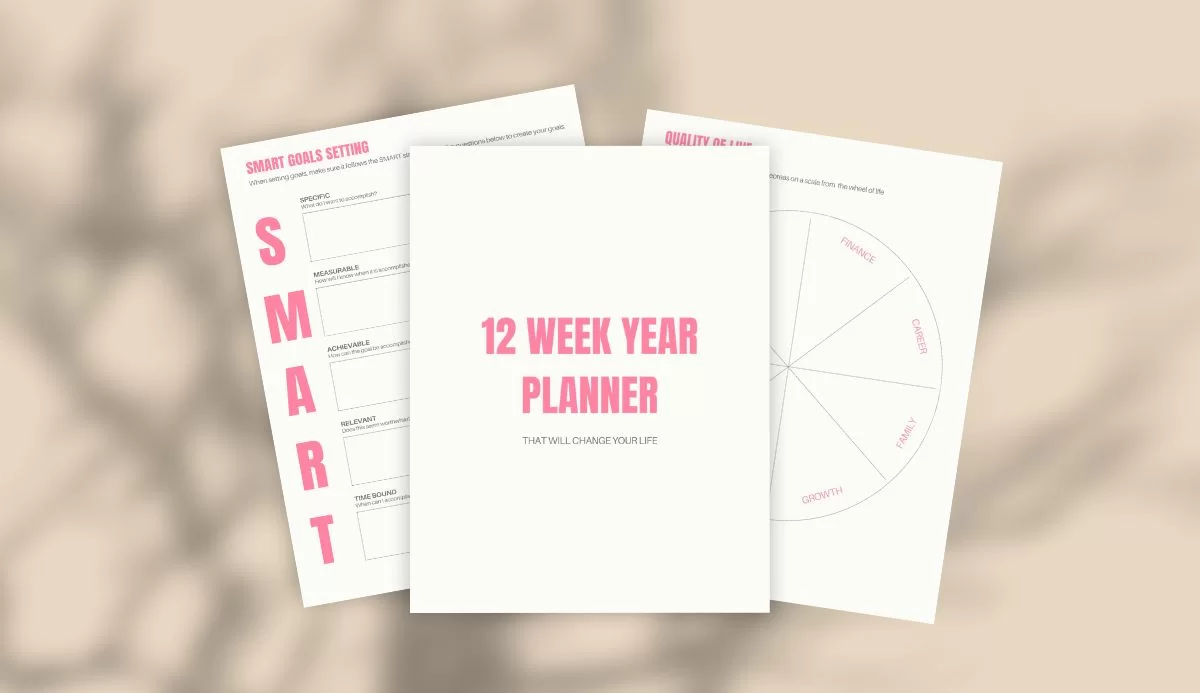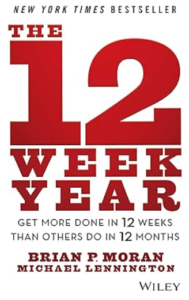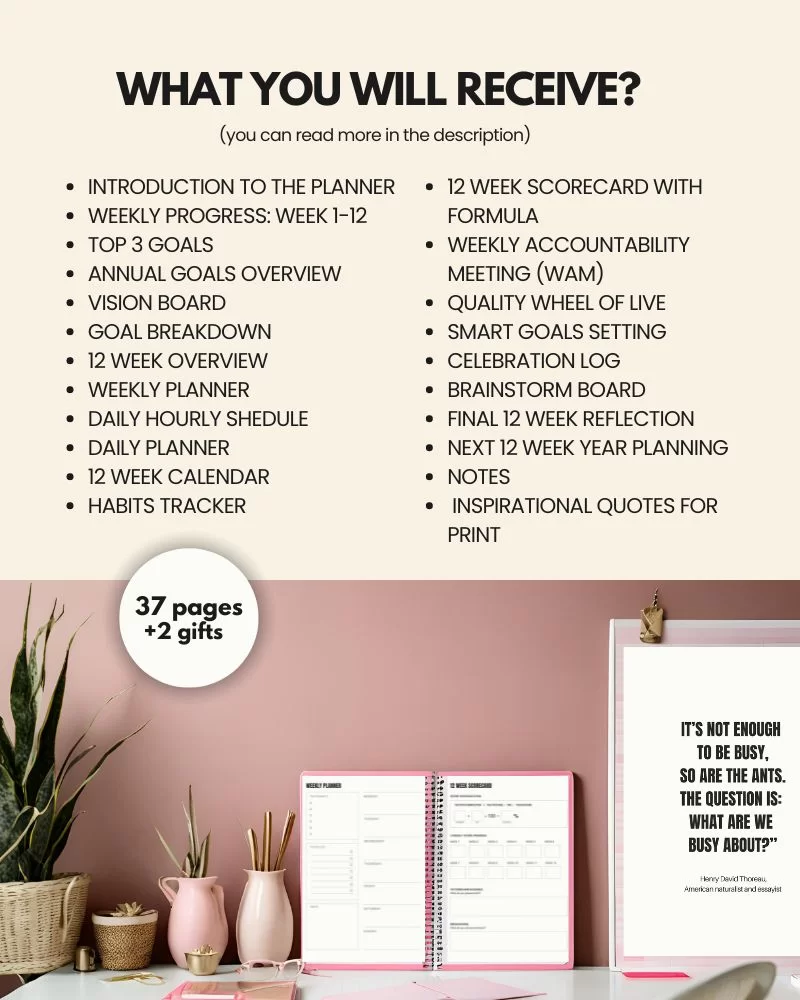
Table Of Contents
What’s a 12 Week Year?
Ever feel like New Year’s resolutions just don’t work? You’re not alone! That’s where the 12 Week Year comes in. It’s a cool way to get stuff done faster and better. Let me break it down for you.
The Big Idea
Imagine squeezing a whole year into just 12 weeks. Sounds crazy, right? But that’s exactly what the 12 Week Year does. Instead of making plans for 12 long months, you focus on just 12 weeks at a time. It’s like sprinting instead of running a marathon!
How It Works
- Pick a few important goals you want to achieve.
- Break these goals into things you can do each week.
- Work hard on these tasks for 12 weeks straight.
- After 12 weeks, look at what you’ve done and start over with new goals.

Why It’s Better Than Regular Yearly Plans
- It’s Faster: You don’t have to wait a whole year to see results. Just 12 weeks!
- It’s Easier to Focus: When you only have 12 weeks, you really pay attention to what’s important.
- It’s Less Overwhelming: Planning for a whole year can be scary. 12 weeks? Not so much!
- You Can Change Things Quickly: If something’s not working, you can fix it in your next 12-week “year”.
Where Did This Idea Come From?
Two smart guys named Brian P. Moran and Michael Lennington came up with this idea. They wrote a book called “The 12 Week Year” that explains it all. They’ve helped lots of people and businesses get more done.

Who Can Use It?
Anyone! Whether you’re trying to lose weight, start a business, or learn a new skill, the 12 Week Year can help. It’s great for:
- Business owners
- Teams at work
- Anyone who wants to achieve their goals faster
Why You Should Try a 12 Week Year
Still on the fence about giving the 12 Week Year a shot? Let me tell you why it’s worth your time.
Get More Done in Less Time
Think about it. How many times have you said, “I’ll get to it someday”? With the 12 Week Year, “someday” becomes “right now”. You’ll be amazed at how much you can accomplish when you’re not spreading your goals over 365 days. It’s like having a deadline for your dreams!
Stay Focused on What Matters
Let’s face it, we all get distracted. Social media, Netflix, that new hobby you picked up last week… But when you’ve only got 12 weeks, you naturally zero in on what’s really important. It’s like putting on blinders that keep you looking straight at your goals.
See Results Faster
Why wait a whole year to celebrate your wins? With the 12 Week Year, you’re constantly making progress and seeing results. It’s like planting fast-growing seeds instead of waiting for a mighty oak. You’ll see sprouts of success in no time, and that’s super motivating!

The Basics of 12 Week Year Planning
Alright, now that you’re pumped to try the 12 Week Year, let’s break down the basics. It’s not just about squishing a year into 12 weeks. There’s a method to the madness!
Key Ideas: The Three Pillars
- Accountability: This is all about owning your actions. No more blaming the dog for eating your homework! When you take responsibility, you take control.
- Commitment: It’s not enough to say you’ll do something. You’ve got to mean it. Commitment is like superglue for your goals – it keeps you stuck to them no matter what.
- Living in the Moment: Forget about next month or next year. Focus on what you can do right now, today, to move towards your goals. It’s about making every day count.
Important Skills: Your 12 Week Year Toolkit
- Vision: This is your personal GPS. Where do you want to be in 12 weeks? In a year? Five years? Having a clear vision helps you set the right goals.
- Planning: Break down your vision into actionable steps. It’s like creating a recipe for success – you need to know all the ingredients and steps.
- Control: Life happens, but you can control your response. This skill helps you stay on track even when things get bumpy.
- Measuring: Keep score! Track your progress regularly. It’s like having a fitness tracker for your goals.
- Using Time Well: Every minute counts in the 12 Week Year. Learn to make the most of your time, cutting out what doesn’t serve your goals.
Remember, these aren’t just fancy words. They’re practical tools you’ll use every day in your 12 Week Year journey. Master these, and you’ll be unstoppable!

Making Your 12 Week Year Plan: Step-by-Step
Alright, it’s time to roll up your sleeves and get planning! Don’t worry, I’ll walk you through each step. By the end of this, you’ll have a solid 12 Week Year plan that’ll knock your socks off. Let’s dive in!
Step 1: Set Your Big Goals
First things first, let’s think big. What do you want to achieve in the long run? Maybe you want to start a business, write a book, or run a marathon. Whatever it is, write it down. These are your North Stars – they’ll guide everything else you do.
Quick Tip: Make sure your big goals excite you. If they don’t make you a little nervous, they might not be big enough!
Step 2: Choose 3 Goals for the Next 12 Weeks
Now, let’s zoom in. Look at your big goals and ask yourself, “What can I do in the next 12 weeks to move closer to these?” Pick three goals. Why three? It’s enough to make real progress, but not so many that you’ll feel overwhelmed.
Remember: Your 12-week goals should be SMART (Specific, Measurable, Achievable, Relevant, and Time-bound). Instead of “get fit”, try “run a 5K in under 30 minutes”.
Step 3: Plan Your Weeks
Here’s where the rubber meets the road. Break each of your three goals into weekly targets. What do you need to do each week to hit your 12-week goal?
For example, if your goal is to write a 60,000-word novel in 12 weeks:
- Week 1-4: Write 5,000 words per week
- Week 5-8: Write 6,000 words per week
- Week 9-12: Write 4,000 words per week and start editing
Step 4: Make a Daily To-Do List
Now we’re getting into the nitty-gritty. Each week, break your weekly targets into daily tasks. Be specific! Instead of “work on novel”, try “write 1,000 words” or “edit chapter 3”.
Pro Tip: Do this at the start of each week. It’ll help you hit the ground running every Monday morning.
Step 5: Track Your Progress
Last but definitely not least, keep score! At the end of each week, check off what you’ve accomplished. Be honest with yourself – this isn’t about feeling good, it’s about making real progress.
Try this: Use a simple scorecard. Give yourself a point for each daily task you complete. Aim for 85% completion each week. If you’re consistently scoring lower, you might need to adjust your plan.
Remember, the magic of the 12 Week Year is in the doing. This plan is your roadmap, but you’re the one who needs to drive the car. Stick to it, and you’ll be amazed at what you can achieve in just 12 weeks!

Tips to Make Your 12 Week Year Work
You’ve got your plan, but how do you make sure it actually works? Here are some tried-and-true tips to keep you on track:
Keep Your Big Goals in Mind
It’s easy to get lost in the day-to-day tasks. But remember, you’re not just checking off a to-do list – you’re building your dream life! Keep your big goals visible. Maybe put a vision board on your wall or set a daily reminder on your phone. Whatever works to keep your eyes on the prize!
Be Realistic About What You Can Do
Ambition is great, but if you set impossible goals, you’re setting yourself up for frustration. Be honest about your time and energy. It’s better to achieve three modest goals than to fail at ten ambitious ones.
Ask Someone to Check on Your Progress
Accountability is key! Find a friend, family member, or mentor who can check in on your progress regularly. Just knowing someone will ask about your goals can be a powerful motivator.
Look at Your Plan Often and Make Changes if Needed
Your 12 Week Year plan isn’t set in stone. Life happens, priorities shift. That’s okay! Review your plan weekly. If something’s not working, don’t be afraid to adjust. Flexibility is your friend!
Dealing with Common Problems
Even with the best plan, you might hit some bumps in the road. Here’s how to handle common hiccups:
What to Do If You Have Too Many Goals
Feeling overwhelmed? It’s time to prioritize. Ask yourself: Which goals will have the biggest impact? Which align best with your long-term vision? Focus on those and put the others on a “someday” list.
How to Stick to Your Plan
Consistency is crucial, but it’s not always easy. Try these tricks:
- Create a routine and stick to it
- Celebrate small wins to stay motivated
- Use the “5-minute rule”: If you’re procrastinating, commit to working on your task for just 5 minutes. Often, you’ll find yourself continuing beyond that!
Balancing Work and Personal Stuff
Your 12 Week Year shouldn’t be all work and no play. Make sure to include personal goals and downtime in your plan. Remember, balance is key to sustainable success!
Tools to Help You (Including PDF Template)
The right tools can make your 12 Week Year journey much smoother. Here are some to consider:
12 Week Year Planner PDF
Grab my comprehensive 12 Week Year planner PDF that will help you map out your goals, track your progress, and stay motivated.
Other Apps and Websites That Can Help
Technology can be your friend in the 12 Week Year journey. Here are some apps to consider:
- Notion: A versatile workspace for note-taking, project management, and more
- Trello or Asana for project management
- RescueTime to track how you spend your time
- Habit trackers like Habitica or Streaks
Ready, Set, Go!
We’ve covered a lot of ground, so let’s do a quick recap of the main points:
- The 12 Week Year compresses a year’s worth of achievement into just 12 weeks.
- It helps you focus, stay accountable, and see results faster.
- The key steps are: set big goals, choose 3 goals for 12 weeks, plan your weeks, make daily to-do lists, and track your progress.
- Tips for success include keeping your big goals in mind, being realistic, getting an accountability partner, and regularly reviewing your plan.
- Common challenges can be overcome with prioritization, consistency, and balance.
- Tools like planners, checklists, and apps can support your journey.
Now, how do you start your own 12 Week Year today? Here’s a simple action plan:
- Take 30 minutes to sit down and think about your big life goals.
- Choose one area you want to focus on for the next 12 weeks.
- Set 3 specific, achievable goals for this 12-week period.
- Plan out your first week in detail.
- Decide on a tracking method – whether it’s our upcoming PDF planner, a simple notebook, or an app.
- Tell someone about your plan and ask them to check in on your progress.
- Start tomorrow – no need to wait for Monday or the first of the month!
Remember, the 12 Week Year isn’t about perfection – it’s about progress. You might stumble, you might have to adjust your plans, but keep moving forward. In 12 weeks, you’ll be amazed at how far you’ve come.
So, are you ready to transform your life, 12 weeks at a time? Your next big achievement is just around the corner. Let’s make it happen!
Frequently Asked Questions About the 12 Week Year
1. Who created the 12 Week Year concept?
The 12 Week Year was developed by Brian Moran, a renowned productivity expert and coach. He introduced this framework to help individuals and organizations achieve breakthrough results through effective execution and goal achievements
2. How does the 12 Week Year differ from annual planning?
Unlike traditional annual planning, the 12 Week Year concentrates on one quarter at a time, creating a sense of urgency and clarity. This short-term focus enhances productivity and helps you perform at your best by providing a fresh start every 12 weeks.
3. What are the key principles of the 12 Week Year?
The 12 Week Year is built on foundational principles such as consistent action, accountability, and effective execution. It emphasizes the importance of daily actions, weekly planning, and regular progress reviews to ensure you stay on track to reach your goals.
4. How do I create a 12-week plan?
To create a 12-week plan, first define your compelling vision across the seven areas of life. Then, establish 2-3 goals for the next 12 weeks. Break these goals down into weekly plans and daily actions or tactics. Remember to build in time to review your progress and adjust as needed.
5. What's the significance of the "85%" rule in the 12 Week Year?
In the 12 Week Year framework, achieving 85% of your planned tactics is considered excellent execution. This percentage acknowledges that life happens and provides a realistic target that can still lead to significant outcomes. Consistently hitting 85% of your tasks can lead to breakthrough results.
6. How much time should I dedicate to 12 Week Year planning and review?
Brian Moran suggests spending about 20 minutes each week planning and reviewing your progress. Additionally, take five minutes at the start of each day to review your tasks and block out time for strategic actions. At the end of each 12-week period, set aside time to assess your results and plan for the next quarter.
7. Can the 12 Week Year be applied to both personal and professional goals?
Absolutely! The 12 Week Year framework is designed to help you create balance and achieve goals in all areas of life. Whether you're looking to enhance your career, improve your health, or pursue a personal passion, this system can be applied to create consistent execution and build momentum.
8. Is there a book or additional resources to help implement the 12 Week Year?
Yes, Brian Moran co-authored "The 12 Week Year" book, which provides a comprehensive guide to the system. It shows you how to implement the framework, overcome difficult times, and achieve your goals. There are also supplementary resources available, including planners, coaching programs, and online tools to support your 12 Week Year journey.
Remember, the key to success with the 12 Week Year is to take action consistently. Give yourself permission to start today – you don’t need to wait for the perfect moment to begin your first 12 Week Year!
As a woman who loves reading, I’ve found many inspiring books written by other women. Here&rsq
Got that sinking feeling you're living someone else's dream instead of your own authentic life?
Harness these 9 psychology-backed decision hacks that successful people use daily—the third one co
Comments
-
tlovertonet
F*ckin’ awesome things here. I am very happy to see your post. Thanks a lot and i’m looking ahead to contact you. Will you kindly drop me a mail?
-
Helen
You’re welcome! You can always write to me hello.redcheekgirl@gmail.com
-







Pingback: How to Create the Life You Actually Want